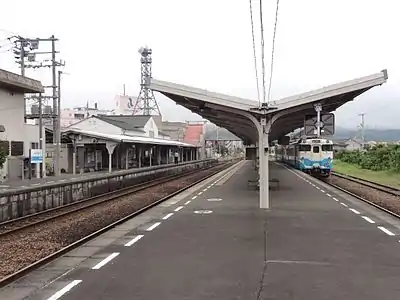Iyo-Ōzu Station
Iyo-Ōzu Station (伊予大洲駅, Iyo-Ōzu-eki) is a railway station on the Yosan Line in Ōzu, Ehime Prefecture, Japan. It is operated by JR Shikoku and is the junction of two branches of the line and hence has two station numbers "U14" and "S18".[1][2]
Iyo-Ōzu Station 伊予大洲駅 | |
|---|---|
 Iyo-Ōzu Station in 2015 | |
| Location | Nakamura, Ozu-shi, Ehime-ken 795-0054 Japan |
| Coordinates | 33°31′07″N 132°32′41″E |
| Operated by | |
| Line(s) | ■ Yosan Line |
| Distance | 243.0 km from Takamatsu |
| Platforms | 1 side + 1 island platforms |
| Tracks | 3 + several passing loops and sidings |
| Construction | |
| Structure type | At grade |
| Parking | Available |
| Disabled access | No - footbridge needed to access island platform |
| Other information | |
| Status | Staffed - JR ticket window (Midori no Madoguchi) |
| Station code | U14, S18 |
| Website | Official website |
| History | |
| Opened | 14 February 1918 |
| Location | |
 Iyo-Ōzu Station Location within Japan | |
Lines
The station is served by the JR Shikoku Yosan Line and is located 243.0 km from the beginning of the line at Takamatsu (measured along the shorter Uchiko branch.[3] Iyo-Ōzu is the first station after the junction of two branches of the line, the older Iyonada branch along the coast and the newer, shorter inland Uchiko branch. As such it carries two station number prefixes, the "S" prefix for stations along the Iyonada branch and the "U" prefix used by stations along the Uchiko branch. Local trains serving both branches stop at the station. Eastbound local trains serving either branch terminate at Matsuyama. Connections with other services are needed to travel further east of Matsuyama on the line.[4]
In addition, the Uwakai limited express from Matsuyama to Uwajima stops at the station.[4]
Layout
The station consists of an island and a side platform serving three tracks. Access to the island platform is by means of a footbridge. The station building houses a waiting room, a JR ticket window (with a Midori no Madoguchi facility) and a JR Travel Centre (Warp Plaza). Car parking is available at the station. Several sidings branch off the tracks, the one beyond track 3 leading to a disused freight platform.[2][5][6][3]
 A view of the station platforms and tracks in 2011. A siding can be seen on the right,
A view of the station platforms and tracks in 2011. A siding can be seen on the right,
Adjacent stations
| « | Service | » | ||
|---|---|---|---|---|
| JR Limited Express Services | ||||
| Uchiko | Uwakai | Yawatahama | ||
| Yosan Line (Iyonada branch) | ||||
| Gorō | Local | Nishi-Ōzu | ||
| Yosan Line (Uchiko branch) | ||||
| Niiya | Local | Terminus | ||
History
The station was opened on 14 February 1918 as Ōzu, the terminus of the private Ehime Railway (愛媛鉄道, Ehime Tetsudō) a 762 mm (2 ft 6 in) light railway line starting from Wakamiya Junction (若宮連絡所, Wakamiya-renraku-sho), near Nagahama-machi (the present Iyo-Nagahama). After the company was nationalized on 1 October 1933, Japanese Government Railways (JGR) took over the station. It was renamed Iyo-Ōzu and now formed part of the Ehime Line (愛媛線, Ehime-sen). On October 6, 1935, after the track had been re-gauged to 1,067 mm, the station became part of the Yosan Main Line. With the privatization of JNR on 1 April 1987, control of the station passed to JR Shikoku.[7][8]
See also
References
- "Shikoku Railway Route Map" (PDF). JR Shikoku. Retrieved 27 December 2017.
- "伊予大洲" [Iyo-Ōzu]. hacchi-no-he.net. Retrieved 19 January 2018.
- Kawashima, Ryōzō (2013). 図説: 日本の鉄道 四国・九州ライン 全線・全駅・全配線・第2巻 四国西部エリア [Japan Railways Illustrated. Shikoku and Kyushu. All lines, all stations, all track layouts. Volume 2 Western Shikoku] (in Japanese). Kodansha. pp. 31, 70. ISBN 9784062951616.
- "Iyo-Ōzu Station Timetable" (PDF). JR Shikoku. Retrieved 19 January 2018.
- "伊予大洲駅" [Iyo-Ōzu Station]. shikoku.org.uk. Retrieved 19 January 2018.
- "伊予大洲" [Iyo-Ōzu]. JR Shikoku Official Station Website. Retrieved 19 January 2018.
- Ishino, Tetsu; et al., eds. (1998). 停車場変遷大事典 国鉄・JR編 [Station Transition Directory - JNR/JR] (in Japanese). II. Tokyo: JTB Corporation. p. 641. ISBN 4533029809.
- Ishino, Tetsu; et al., eds. (1998). 停車場変遷大事典 国鉄・JR編 [Station Transition Directory - JNR/JR] (in Japanese). I. Tokyo: JTB Corporation. pp. 213–215. ISBN 4533029809.
External links
| Wikimedia Commons has media related to Iyo-Ozu Station. |
- Iyo-Ōzu Station (JR Shikoku) (in Japanese)